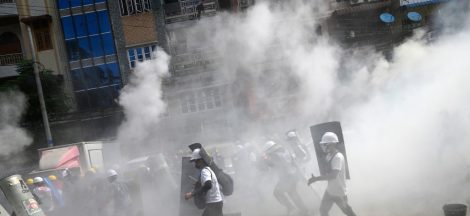Esemka faces long, bumpy road ahead. Locally made car brand Esemka may be Indonesia’s pride but substantial challenges lie ahead for the development of a local automotive manufacturing industry against the backdrop of low demand and weak connectivity domestically and with the international supply chain.

President Joko “Jokowi” Widodo brought Esemka to the public’s attention in 2012 when he was mayor of Solo, Central Java. At the time, he chose the car, which was assembled by vocational high school students in Solo, as his official vehicle.
Seven years later, he opened a new path for Esemka by inaugurating the production facility of PT Solo Manufaktur Kreasi, the car’s manufacturer, in Sambi, Boyolali, Central Java. Two Esemka models, the 1,200 cc and 1,300 cc commercial pick-up trucks, Bima 1.2 and Bima 1.3, respectively, were introduced to the public at prices of around Rp110 million (US$7,819) per unit.
“These Esemka cars are the nation’s creation,” said Jokowi during the ceremony on Friday. “Although their raw materials are not 100 percent domestically sourced yet, we hope that going forward the Esemka can use 100 percent raw materials from Indonesia.”
Industry Minister Airlangga Hartarto said 60 percent of Esemka’s Bima components were produced domestically while the 300 or so people working in the factory were mostly vocational school graduates in Solo.
“I don’t force you to buy the cars, but they are indeed good ones, I’ve seen them myself. If people still buy imported cars, it will be outrageous,” Jokowi said, expressing the hope that the facility’s opening would have a positive impact on the economy of Central Java, especially Boyolali, since the automotive industry involves many other industries and creates multiplier effects.

The government under Jokowi’s leadership has been struggling to revive the country’s manufacturing sector, whose contribution to Indonesia’s gross domestic product (GDP) has persistently declined from its peak of more than 30 percent in 2002 to only around 20 percent so far this year. It believes a strong manufacturing industry will help boost the country’s economic growth, which slid to the lowest level in two years at 5.05 percent year-on-year in the second quarter.
However, Esemka appears to face a long and bumpy road in its development, just like the country’s automotive industry as a whole, which has seen falling demand as a result of weaker economic conditions.
The Association of Indonesian Automotive Manufacturers (Gaikindo) has kept its annual automotive sales target unchanged from last year’s 1.1 million units. The number is actually slightly lower than 2018’s achieved sales of 1.15 million units.
In the first half of the year, car sales declined by 14 percent compared to the same period in 2018 with almost all brands suffering lower sales.
At the same time, exporting vehicles is a difficult task for many of Indonesia’s car manufacturers, a fact discussed during a closed-door meeting between Jokowi and World Bank country director for Indonesia and Timor-Leste Rodrigo A. Chaves, among other officials, at the State Palace last week.
“Exporting cars requires being part of integrated supply chains across multiple countries. Indonesia is largely cut-off,” according to a part of the World Bank’s presentation, a copy of which was obtained by The Jakarta Post.
The Washington-based institution explained Indonesia was cut off from global supply chains in the manufacturing of exports because components imported to produce exported products were subject to costly, time-consuming and discretionary non-tariff measures, such as pre-shipment inspections, third-party verification of compliance with national standards and import approval and recommendation letters from the Industry Ministry.
“Exports are not competitive because the majority of inputs are subject to import tariffs,” it said.
“No amount of tax incentives and/or holidays can correct these problems and make Indonesia internationally competitive […] instead Indonesia must surprise investors with bold reforms that create credibility that Indonesia is really open for business, certainty that rules are predictable and not discretionary and compliance with the President’s policy,” the World Bank went on to say.
Publicly listed diversified conglomerate PT Astra International director Gidion Hasan acknowledged the challenges the company faced when trying to export its cars.
“Unfortunately, Indonesia’s exports base is still MPV [multipurpose vehicle] cars, when the world demand is for sedans. So, there is still a mismatch between Indonesia’s automotive industry capability and the global market,” he said last week.
Gidion also highlighted several challenges faced by the industry, which included a lack of tariff harmonization for car materials and components, labor issues and the enhancement of raw material producers of steel, aluminum, plastic and synthetic rubber, which are currently unable to supply local automotive manufacturers.
The tariff barrier, he said, was still so low that the influx of imports of automotive goods and spare parts to Indonesia was strong and overwhelmed the domestic industry.
Bank Indonesia Deputy Governor Dody Budi Waluyo took note of the challenges faced by manufacturing industry.
“If we take a look at a study by Bank Indonesia, there are two core problems that are obstacles to the manufacturing sector’s growth, namely how we improve our domestic value chain and how we use more local production input in manufacturing,” he said.
The low interlinkage in Indonesia’s manufacturing means products needed in local production are exported instead of being used to fulfill domestic demand, he added. Esemka faces long, bumpy road ahead (Ganug Nugroho Adi and Riza Roidila Mufti, The Jakarta Post)






 Mendesain Mobil Sesuai Selera, Rakit Sendiri di Grasi
Mendesain Mobil Sesuai Selera, Rakit Sendiri di Grasi 